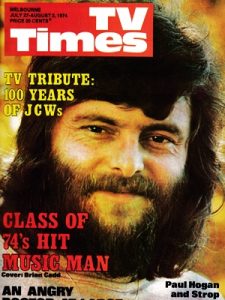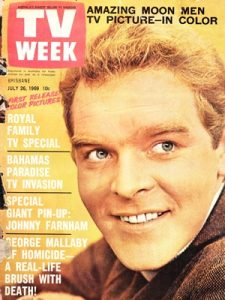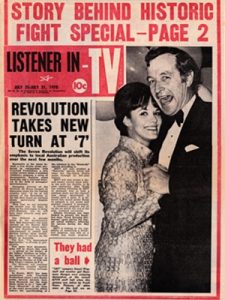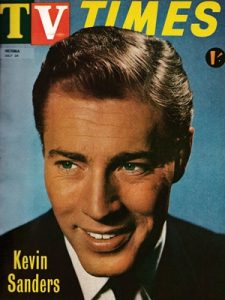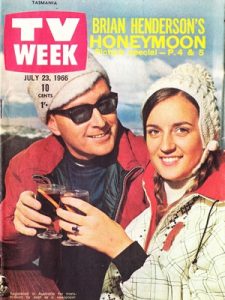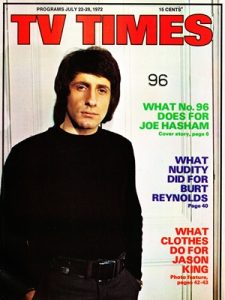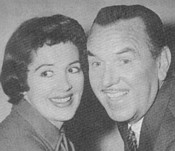
In 1956 the first game show to appear on Australian television was TCN9’s Name That Tune hosted by Bruce Gyngell. Since then, game shows have become a popular fixture with Australian viewers and have featured regularly and prominently, particularly on the commercial networks.
However despite all the numerous game shows and formats that have hit our screens since 1956, only four game show formats stand out at the most successful.
Pick-A-Box, Superquiz:
Bob Dyer’s Pick-A-Box began as a radio program in 1948. With the advent of television in the 1950s several radio programs made the switch to the new medium and Pick-A-Box was no exception.
Beginning on Sydney’s ATN7 and Melbourne’s GTV9 (later changing over to HSV7) in March 1957, Pick-A-Box, with husband and wife team Bob and Dolly Dyer, became an early favourite with viewers every Monday night. It was one of the first major national shows on Australian TV and host Bob Dyer collected a TV Week Gold Logie in 1961 for Most Popular Personality on Television.
Although the basic format of the show was quite simple – quizzing contestants on questions of general knowledge – Dyer claimed that Pick-A-Box launched a number of innovations in the production of game shows on Australian TV, and championship contestants became celebrities. The most famous being Barry Jones who went on to become a member of Parliament in the State of Victoria.
Dyer, who produced and packaged the show for the Seven Network, decided in 1969 that it was time to start thinking about ending the show. After approximately 900 episodes, Pick-A-Box ended in 1971. As they owned the program, the Dyers then reviewed most of the archived episodes, kept a few as souvenirs and discarded most of them. The couple then retired to Queensland where Bob pursued his other great love – fishing.
It was 1981 before the Pick-A-Box format was revived. The Nine Network resurrected the format under the title Superquiz. Hosting the program was another husband and wife team — Bert and Patti Newton. Superquiz rated well but Nine did not continue the program after the first year.
The format was tried again in 1989 on the financially troubled Ten Network — once again as Superquiz. Hosting this time was former daytime TV host Mike Walsh and Deborah Hutton. As with most Ten Network programs at the time, Superquiz was short lived.

The Great Temptation, Sale Of The Century, Temptation:
Although Sale Of The Century began in 1980, its origins dated back to 1970 with the popular Seven Network game show Great Temptation.
Temptation, with Tony Barber and Barbie Rogers, began as a daytime program but was later extended to prime time with the launch of Great Temptation. In 1973, Barber won the TV Week Gold Logie.
The show only faltered when, in 1974, Seven decided to move Great Temptation from the 7pm timeslot to the later 8.30pm timeslot to try and drag viewers away from the rival 0-10 Network’s hugely popular series Number 96. Number 96 won the battle and Great Temptation was gone by 1975.
Producer Reg Grundy revived the format in 1980 using the original overseas title, Sale Of The Century. The Nine Network took on the program and, in an unusual move, launched it halfway through the 1980 ratings season in the all-important 7pm timeslot. Hosted once again by Tony Barber, joined this time by actress Victoria Nicolls, Sale Of The Century was an immediate success for Nine achieving record ratings for the timeslot.

In 1982, Nicolls left and was replaced by Delvene Delaney, who in turn was replaced by actress Alyce Platt in 1986. In early 1991 both Barber and Platt decided to leave the program. Sale continued with a new team — Glenn Ridge, whose only other TV work was in regional television, and model Jo Bailey.
Bailey was later followed by Nicky Buckley, and then Karina Brown.
In 2000, Nine re-labelled the show Sale Of The New Century, reverting back to the shorter title in 2001. Declining ratings led to Nine “resting” the program at the end of the year with plans to launch a revamped Sale later.
In May 2005, Nine finally re-launched the program as Temptation, adapting the former 1970s title. Hosting the new program was Ed Phillips and Livinia Nixon. Temptation ceased production in 2008 and made its last appearance in January 2009.
The Price Is Right:
The Price Is Right made its first appearance in Australia with local versions in each of Sydney and Melbourne in the 1950s.
In 1963, the Seven Network launched the first ‘national’ version with host Horrie Dargie.
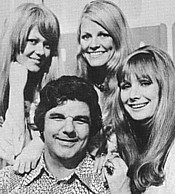
The show later re-appeared on the 0-10 Network in 1973 with host Garry Meadows. The 1973 version, based on the revised format launched in the US, was successful enough that 0-10 produced both daytime and night time editions.
The next appearance came in 1981 with the slightly re-titled The New Price Is Right, with host Ian Turpie for the Seven Network. Screening weeknights as a lead in to the news, the show was produced in Melbourne’s Festival Hall as Seven’s Melbourne studios were not large enough to house the mammoth production. Seven continued the show until 1985.
In 1989 Network Ten revived The Price Is Right as a weekly format on Saturday nights, once again with Turpie as host. However the show failed to raise enough interest up against Nine’s popular Hey Hey It’s Saturday.
Nine was next to pick up the format in 1993 with host Larry Emdur, slotting the show in a late afternoon timeslot. This version ran until the late 1990s. In June 2003, Nine once again revived the program, again with Emdur, as the lead in to Nine’s 6pm news.
Following a prolonged battle with Seven’s Deal Or No Deal, The Price Is Right ended in December 2005.
Emdur, a co-host of Seven’s popular The Morning Show since 2007, has since hosted another version of the franchise with The Price Is Right making a return to Seven’s late afternoon schedule in May 2012.
Wheel Of Fortune:
Another radio quiz show to make the change to television was Wheel Of Fortune, launching on TCN9 in 1959. The modest afternoon program was initially hosted by Reg Grundy and marked the beginning of what would become a global television empire in Grundy Television Productions (Grundy has since sold the company and it is now part of the international FremantleMedia Group).
After a long break, Wheel Of Fortune was revived in July 1981 as an early evening program. Although it had the same title as the 1959 program, the format was significantly different as it had adopted the overseas concept. The new series was produced by Grundy’s at the studios of ADS7 Adelaide for the Seven Network, hosted by Ernie Sigley and Adriana Xenides. Sigley left the show in 1984, replaced by radio identity John Burgess.
In a controversial step in 1996, Seven replaced Burgess with Tony Barber and moved production to Sydney. The show underwent a major revamp with new segments. The new format and host was not a hit with viewers and the program soon reverted back to its traditional format. In 1997, Barber was replaced with Rob Elliott.
Xenides continued with the program until 1999, becoming the longest-serving game show hostess in the world. She was later replaced by Sophie Falkiner.
In 2004, Elliott was replaced by Steve Oemcke and the presentation was revamped. The timeslot changed from 5.30pm to 5pm to accommodate the new game show Deal Or No Deal which has given Seven a stronger lead-in to the 6pm news.
In 2005, Wheel Of Fortune took an extended break but returned early in 2006 with new host Larry Emdur and Laura Csortan. However despite promising audience numbers, Seven cancelled the program mid-year with Wheel Of Fortune making its final appearance on Friday 28 July 2006.
In March 2008, the Nine Network announced it had bought the format to Wheel Of Fortune and had signed up Tim Campbell, formerly of Seven Network programs Home And Away and National Bingo Night, to host the new show. The new program, re-titled Million Dollar Wheel Of Fortune, failed to gain a significant audience share up against Seven’s Deal Or No Deal and was soon cancelled.
DO YOU REMEMBER… ?
Other Australian TV Game Shows:
$50,000 Letterbox
1 vs 100
A Question Of Sport
ADbc
All-Star Squares
Almost Anything Goes
Are You Smarter Than A 5th Grader?
Australia’s Brainiest
Battle Of The Sexes
Beat The Star
Bert’s Family Feud
Blankety Blanks
Blind Date
Burgo’s Catchphrase
Cash Bonanza
Casino 10
Catch Us If You Can
Celebrity Squares
Celebrity Tattletales
Coles £3000 Question
Coles $6000 Question
Concentration
Crossfire
Deal Or No Deal
Dog Eat Dog
Double Dare
Family Double Dare
Family Feud
Flashback
Generation Game
Give It A Go
Go Go Stop
Greed
Head 2 Head
High Rollers
Hole In The Wall
Hot Spell
Hot Streak
It Could Be You
It’s A Knockout
It’s Academic
I’ve Got A Secret
Jackpot Quiz
Jeopardy
Keynotes
Let’s Make A Deal
Letters And Numbers
Man O Man
Mastermind
Matchmates
Million Dollar Chance Of A Lifetime
Million Dollar Minute
Millionaire Hot Seat
Minute To Win It
Moneymakers
National Bingo Night
Now You See It
Out Of The Question
Pass The Buck
Password
Perfect Match
Personality Squares
Pick Your Face
Play Your Cards Right
Power Of 10
Press Your Luck
Pyramid Challenge
Quizmania
Quizmaster
RockWiz
Say G’day
Say When
Shafted
Spending Spree
Spicks And Specks
Supermarket Sweep
Taken Out
Talkin’ ’bout Your Generation
Tell The Truth
The Celebrity Game
The Con Test
The Einstein Factor
The Great TV Game Show
The Love Game
The Main Event
The Marriage Game
The Master
The Mint
The Newlywed Game
The Oz Game
The Rich List
The Trophy Room
The Weakest Link
Three On A Match
Total Recall
Treasure Hunt
Trivial Video Show
Video Village
Vidiot
Who Wants To Be A Millionaire
Who What And Where?
You May Be Right
